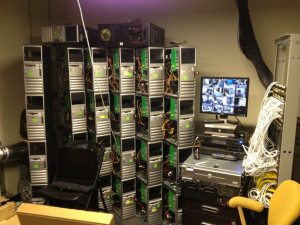Today at least 98% of government issued currencies are scriptural money, also known as “digital money”. This digital money is kept in commercial banks accounts or networks, and flows as digits in the database on a bank’s computer servers. This is not dramatic in itself, because banking services like (paying bills online, transferring money, credit card…) are very useful services. The issue is that, in order for individuals to have access to those basic banking services they need to deal with financial institutions that will act as trustees. This is where the moral hazard lies as we will explore in this article.
The Moral Hazard With Banks
When you deposit cheques or cash in your bank account you are actually lending this money to the bank, and legally you don’t own it anymore. The bank is the new owner of this money. However, when you process a transaction, let’s say you buy an Item online; it is your bank that is processing the transaction for you, and in exchange for this service the bank needs to access your personal information. Each time you use the banking services you are giving up your identity and your anonymity. The current financial system, forces us to deal with third parties (financial institution) each time we wish to access to ‘’basic banking services’’. Those financial institutions have formed a cartel that made the cost of banking services extremely high. Which fees will continue to go as stricter rules are applied to the banking system. Customers must pay fees to banks every time they use the banking network to transfer money. The result of this system is that more than 90% of the world population doesn’t t have access to credit card or even a bank account.
A Bitcoin Banking System
On the other hand, a Bitcoin banking system would work much more differently. Bitcoin’s are distributed, peer-to-peer digital currency that functions without the intermediate of any central authority. The concept was introduced in a 2008 paper by a pseudonymous developer known as “Satoshi Nakamoto”. Bitcoin’s value has increased to unimaginable levels in recent months, which verifies the popularity and demand for a competing currency by the consumer.
Bitcoins are created through the ‘’mining process’’. Mining means providing computer power to solve complex algorithms. The reward for the miners is a block of 25 Bitcoins. The total number of Bitcoins that will be issued is limited to 21million Bitcoin; there is currently 12 million Bitcoin in circulation (already created). Whereas there the US government reported statistic M2 (M1 supply, plus all of the money held in money market funds, savings accounts, and certificates of deposits (CDs) under $100,000.) in August 2013 was about $10.77 trillion [source: Federal Reserve].
Bitcoin Mining Farm :
“Where did the fiat money come from? It came – and this is the most important single thing to know about modern banking – it came out of thin air.” –Murray Rothbard
Bitcoins, are stored in a personal wallet, a Bitcoin wallet is a digital portfolio that has a public key and a private key. The public key is your Bitcoin address or identifier. The private key is a secret number that allows Bitcoin to be spent. Everyone has the possibility to own more than 100 million different addresses.
All Bitcoin transaction are visible and are recorded in a public ledger (a ledger in accounting, is a book that you cannot edit once you have written in it) called the Blockchain. This ledger is updated by the Bitcoin users themselves, without any third party or fiduciary. It is completely decentralized, peer to peer system. The Blockchain is like an asset register that permits to see and track all Bitcoins in circulation.
The ownership of Bitcoin remains totally anonymous through cryptography. One of the early Bitcoin developer said: “Even though the transactions are public, the individuals tied to the transactions are anonymous. This is similar to how the stock exchange makes stock values public without disclosing individual owners.”
Our current financial system is the complete opposite, the banks act as third parties each time we use their network to make transactions. The ledgers are not public or updated by the users themselves, otherwise they are private, controlled and managed by the banks. The current financial system is entirely centralized and controlled by banks.
Thanks to the state’s privilege of being the unique providers of banking services. Banks have made the cost of transactions extremely expensive. Since bitcoins are a decentralized peer to peer currency; there is no third party that we have to pay, in order to access the banking network. Therefore, Bitcoin transactions are almost or totally free. The equivalent of a 6 million dollar worth of Bitcoin got transferred from a wallet in the US to a wallet in the UK. The fees for this transaction were 6 cents. PayPal for exactly the same transaction would have charged more than 100000$.
Many experts think that the impact of Bitcoin and crypto currencies in general, on the current financial system, will be very similar to the impact of MP3 introduction and the peer to peer media sharing networks on the music industry. Bitcoin is already catching the attention of governments and banks. Countries like China and Russia encourage the usage and the acceptance of Bitcoin, as a method to avoid the US dollar petro system and its chronic inflation. Let’s face it, our system is broken and we need a new one, I am just suggesting that bitcoins could replace or bring in competition to our current monetary system. The end result would most likely bring more power and freedom to the middle class and a higher standard of living by removing unnecessary costs.
Do you think Bitcoins has the power to destroy and rebuild our current financial system?



